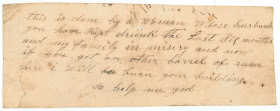 Sometime during the mid-1800's, a distraught wife wrote this brief note to Albert Dewey, a mill owner in Quechee, Vermont, begging him not to buy any more rum for his workers. In 1882, the New Hampshire Temperance Union urged farmers to raise better apples that were a "blessing not a peril," and to avoid making hard cider because it made "men cross, ferocious, bloodthirsty." Alcohol, its use, abuse and prohibition, does tend to evoke strong and, sadly in some cases, violent responses.
Sometime during the mid-1800's, a distraught wife wrote this brief note to Albert Dewey, a mill owner in Quechee, Vermont, begging him not to buy any more rum for his workers. In 1882, the New Hampshire Temperance Union urged farmers to raise better apples that were a "blessing not a peril," and to avoid making hard cider because it made "men cross, ferocious, bloodthirsty." Alcohol, its use, abuse and prohibition, does tend to evoke strong and, sadly in some cases, violent responses.
 |
| Broadside 000064 |
 Two days later, Dartmouth President Ernest Martin Hopkins made a formal statement to the press, denying that there had been any general system of smuggling of liquor into Hanover, and that the College authorities had, by every device available, kept watch and checked every known source of supply. He was loath to state this much, in case such diligence on the part of the College would imply an overwhelming need for such oversight, or that specific incidents would cast a bad light on the majority of students who did not partake of illegal drink.
Two days later, Dartmouth President Ernest Martin Hopkins made a formal statement to the press, denying that there had been any general system of smuggling of liquor into Hanover, and that the College authorities had, by every device available, kept watch and checked every known source of supply. He was loath to state this much, in case such diligence on the part of the College would imply an overwhelming need for such oversight, or that specific incidents would cast a bad light on the majority of students who did not partake of illegal drink.
However, in May the following year, President Hopkins was forced to admit in a letter to Matt Jones, Class of 1894, that the campus was in great trouble due to gallons of bootleg alcohol coming into town from Rutland and White River Junction, Vermont, and from New York. "I would like some real he-men with automatic revolvers and backbone who would hold up some of the suspicious automobiles that are floating around here…"
 |
| Broadside 001374 |
Ask for ML-61, box 23, folder 25 to see the letter from the Dewey papers, Broadside 000064, Broadside 003174, and Henry Maroney's 1919 Alumni file.
No comments:
Post a Comment